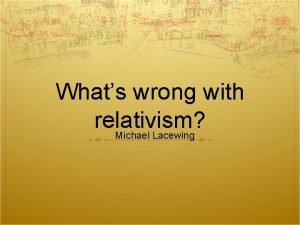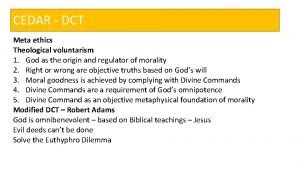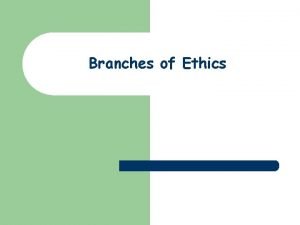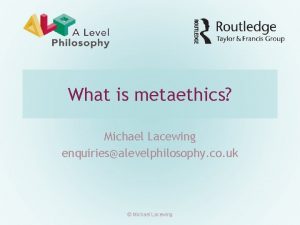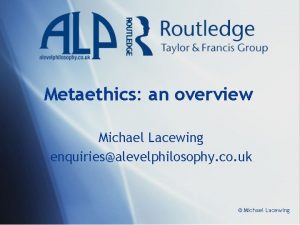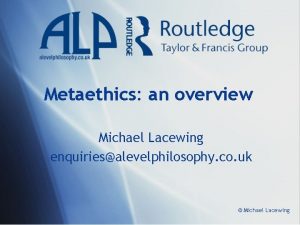Introducing metaethics Michael Lacewing enquiriesalevelphilosophy co uk What








- Slides: 8

Introducing metaethics Michael Lacewing enquiries@alevelphilosophy. co. uk

What is metaethics? • Normative ethics: a theoretical account of which actions, motives and character traits are right or good – Intended to provide guidance on how to live • Metaethics does not provide guidance, it asks what morality is, philosophically speaking

Metaethics • Philosophy of language: what does moral language mean? – What is its function – to state facts, to influence people, to express disapproval? – Can moral judgments be true or false? • Metaphysics: what kind of thing is morality? – Does moral judgments state objective (mindindependent) truths? – Do they state subjective (mind-dependent) truths?

Metaethics • Epistemology: if there are moral truths, how can we discover them? – If there are no objective moral truths, how should moral reasoning or justification proceed? • Philosophy of mind: what is it to hold a moral view? – Is it a kind of belief, desire, or some other state? – Is it a mental state that is motivating?

Cognitivism vs. non-cognitivism • Cognitivism: moral judgments, e. g. ‘Murder is wrong’ – Aim to describe how the world is – Can be true or false – Express beliefs that the claim is true • Non-cognitivism: moral judgments – Do not aim to describe the world – Cannot be true or false – Express attitudes towards the world

Mental states and ‘direction of fit’ • The two directions of fit: the shopping list • Beliefs are mind-to-world – We change our beliefs to fit the world • Desires are world-to-mind – We change the world to satisfy our desires • Which direction of fit do moral views have?

Motivation • Non-cognitivism: moral judgments are intrinsically motivating; beliefs are not intrinsically motivating; therefore, moral judgments don’t express beliefs – Why think beliefs don’t motivate? Because how can finding out how the world is (the facts) on its own engage us to care? • Cognitivist reversal: moral judgments express beliefs; beliefs are not intrinsically motivating; therefore, moral judgments are not intrinsically motivating

Issues • To non-cognitivism: morality isn’t a matter of taste. Will non-cognitivism become moral scepticism? • To cognitivism: how can moral judgments be objectively true or false? How can there be objective moral properties? How can we discover them?






